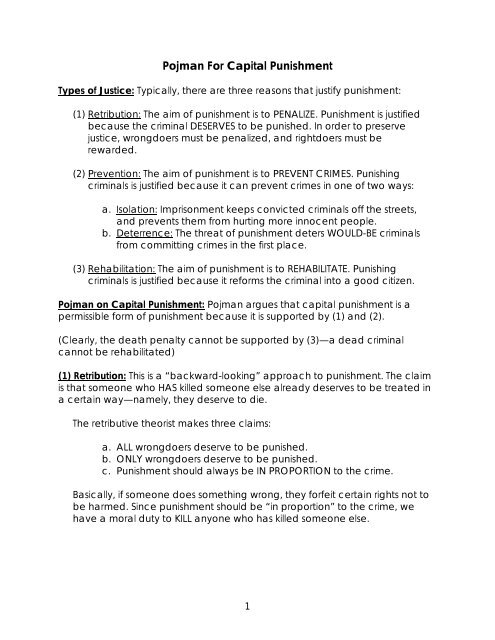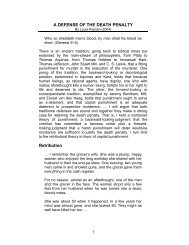Pojman For Capital Punishment - Rintintin Colorado
Pojman For Capital Punishment - Rintintin Colorado
Pojman For Capital Punishment - Rintintin Colorado
Create successful ePaper yourself
Turn your PDF publications into a flip-book with our unique Google optimized e-Paper software.
<strong>Pojman</strong> <strong>For</strong> <strong>Capital</strong> <strong>Punishment</strong><br />
Types of Justice: Typically, there are three reasons that justify punishment:<br />
(1) Retribution: The aim of punishment is to PENALIZE. <strong>Punishment</strong> is justified<br />
because the criminal DESERVES to be punished. In order to preserve<br />
justice, wrongdoers must be penalized, and rightdoers must be<br />
rewarded.<br />
(2) Prevention: The aim of punishment is to PREVENT CRIMES. Punishing<br />
criminals is justified because it can prevent crimes in one of two ways:<br />
a. Isolation: Imprisonment keeps convicted criminals off the streets,<br />
and prevents them from hurting more innocent people.<br />
b. Deterrence: The threat of punishment deters WOULD-BE criminals<br />
from committing crimes in the first place.<br />
(3) Rehabilitation: The aim of punishment is to REHABILITATE. Punishing<br />
criminals is justified because it reforms the criminal into a good citizen.<br />
<strong>Pojman</strong> on <strong>Capital</strong> <strong>Punishment</strong>: <strong>Pojman</strong> argues that capital punishment is a<br />
permissible form of punishment because it is supported by (1) and (2).<br />
(Clearly, the death penalty cannot be supported by (3)—a dead criminal<br />
cannot be rehabilitated)<br />
(1) Retribution: This is a “backward-looking” approach to punishment. The claim<br />
is that someone who HAS killed someone else already deserves to be treated in<br />
a certain way—namely, they deserve to die.<br />
The retributive theorist makes three claims:<br />
a. ALL wrongdoers deserve to be punished.<br />
b. ONLY wrongdoers deserve to be punished.<br />
c. <strong>Punishment</strong> should always be IN PROPORTION to the crime.<br />
Basically, if someone does something wrong, they forfeit certain rights not to<br />
be harmed. Since punishment should be “in proportion” to the crime, we<br />
have a moral duty to KILL anyone who has killed someone else.<br />
1
Objections:<br />
1. Isn’t this just endorsing revenge-killing?<br />
Reply: We must not confuse vengeance with retribution. Revenge is the act<br />
of “getting back” at someone out of anger. Retribution is the duty to right the<br />
scales of justice by meting out punishments that are in proportion to a crime.<br />
2. Ted Bundy raped and killed 100 women. We can only kill Ted Bundy once.<br />
Reply: In order to mete out a punishment that is “in proportion to the crime,”<br />
<strong>Pojman</strong> actually suggests torture as a possible option in this sort of case. (!)<br />
[Objections (3) and (4) are not addressed by <strong>Pojman</strong>]<br />
3. If punishment should be “in proportion” to the crime, should we rape<br />
rapists? Should we sadistically torture sadistic torturers? Should we<br />
psychologically terrorize those who have terrorized others? This seems<br />
barbaric.<br />
4. <strong>Pojman</strong> constantly mentions that a killer FORFEITS their right to life. He then<br />
infers—as if this is entailed by the loss of one’s right to life—that someone<br />
who has forfeited their right to life DESERVES TO DIE. It might seem that he<br />
is making the claim that, if someone or something LACKS a certain<br />
negative right (e.g., the right not to be harmed), then we are OBLIGATED<br />
to do something to them (in this case, HARM them). But, this does not<br />
follow. Many meat-eaters argue, for instance, that animals do not have a<br />
right not to be harmed. But, it does not follow from this that we are morally<br />
OBLIGATED to harm them! The LACK of a duty of NON-maleficence does<br />
not entail the PRESENCE of a duty of maleficence. Similarly, it would seem<br />
that, even if a killer forfeits their right to life, it does not follow that we are<br />
OBLIGATED to kill them.<br />
(2) Prevention By Deterrence: This is a “forward-looking” approach to<br />
punishment. The claim is that, if we regularly kill killers, then this practice will deter<br />
future people from killing others.<br />
Objections:<br />
1. There is no conclusive evidence that the death penalty deters killers.<br />
Reply: Surely, an IDEAL system of capital punishment would deter killers from<br />
killing. Imagine that, every time someone killed someone else, they were<br />
2
instantly struck down by lightning. Clearly, killers would think twice before<br />
killing in this case.<br />
Evidence is inconclusive in the actual case, because our actual situation is<br />
not IDEAL. In the ideal case, punishment was swift, public, and universal. In<br />
reality, we rarely use the death penalty (only about 1/750 th of the time),<br />
punishment is slow (it takes over 10 years on average to administer the<br />
punishment), and not public. <strong>Pojman</strong> suggests that, if we made our actual<br />
practice closer to the ideal, it would CERTAINLY deter killers.<br />
The Best Bet Argument: <strong>Pojman</strong> argues that, ultimately, even if it is possible that<br />
the death penalty is NOT an effective deterrent of killings, it is still the best bet.<br />
Consider the 4 possibilities:<br />
We DO kill killers<br />
(we do use capital<br />
punishment)<br />
We do NOT kill killers<br />
(no capital<br />
punishment)<br />
It DOES Deter Killings It Does NOT Deter Killings<br />
(1)<br />
We save many innocent<br />
victims’ lives<br />
(3)<br />
We fail to save many<br />
innocent lives when we<br />
could have<br />
3<br />
(2)<br />
We unjustly kill murderers<br />
(4)<br />
We save many guilty<br />
murderers’ lives<br />
<strong>Pojman</strong> argues that using capital punishment is the best option. Clearly, (1) is<br />
a benefit. Granted, if the death penalty does not deter killings, then we have<br />
unjustly killed murderers (2). But, <strong>Pojman</strong> claims, innocent people have a<br />
greater right to life than the guilty, so the difference between (1) and (3) is<br />
MUCH greater than the difference between (2) and (4).<br />
Rebuttal: <strong>Pojman</strong>’s “Best Bet” argument assumes that, if capital punishment<br />
DOES deter would-be killers from killing, then it is a justified form of<br />
punishment. But, perhaps it is not. In that case, “unjustly killing murderers”<br />
should be included in both options (1) AND (2).
2. Wouldn’t prison deter killings just as well as the death penalty?<br />
Reply: No. Clearly, a short sentence doesn’t deter as much as a long one;<br />
and clearly death is a greater deterrent than a long penalty. There is a sort of<br />
panic that is found in cases of capital punishment that is not found in cases<br />
of prison sentences (lengthy appeals process, etc.)—this fact alone is a good<br />
indicator that the death sentence is feared more.<br />
In any case, it certainly deters more prison murders. A dead convict cannot<br />
kill other inmates like a live one can.<br />
Rebuttal: In response to this latter reason, can’t we just put killers in solitary<br />
confinement so they do not get the opportunity to kill other prisoners?<br />
3. The death penalty discriminates against the poor and minorities.<br />
Reply: Evidence for this is inconclusive, and even if it WERE, it would not<br />
demonstrate that capital punishment is PRIMA FACIE wrong—the punishment<br />
might be permissible, but the way that it is carried out is not. This simply<br />
means that we need to reform our justice system to prevent this sort of<br />
discrimination.<br />
Rebuttal: Unless the pro-death penalty people are willing to pay a lot more<br />
taxes to give people accused of murder better lawyers, it will always be the<br />
case that a poor person is more likely to get the death penalty than a rich<br />
person.<br />
4. The innocent are sometimes mistakenly convicted and given the death<br />
penalty. (over 100 cases in the last 30 years)<br />
Reply: It is known that allowing cars to use the roads will lead to 50,000 traffic<br />
fatalities per year. But, we allow them anyway because the benefits<br />
outweigh the costs. <strong>Capital</strong> punishment is like that.<br />
Rebuttal: In the car case, we merely ALLOW innocent killings to occur. In the<br />
death penalty case, we CAUSE the killing of innocent to occur (DO) in order<br />
to avoid allowing others to kill innocent people. If doing harm is much worse<br />
than allowing it, then this is much different than the car case. Imagine, for<br />
instance, that someone says, “I want you to go out and murder one innocent<br />
person, or else I will murder 10 innocent people.” It might be wrong to murder<br />
the one person here (i.e., if DOING harm is more than 10 times worse than<br />
ALLOWING it) even if the benefits outweigh the costs. [What do you think?]<br />
4




